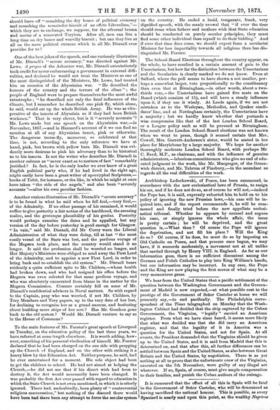Another curious illustration of Mr. Disraeli's "severe accuracy" is to
be found in what he said when he fell foul,—very foul,— of the Admiralty. If no other passage of his remained, it would suffice to give posterity a fair notion of the hardihood, the amusing malice, and the grotesque plausibility of his genius. Posterity would perhaps examine the dates and be appalled, but any version of the day before yesterday is good enough for Glasgow. "In vain," said Mr. Disraeli, did Mr Corry warn the Liberal Administration of what they were doing, till at last " the most costly vessel of the State was lost, and the perilous voyage of the Megmra took place, and the country would stand it no longer. It said the profession shall be worried no longer, and Her Majesty's Ministers were obliged to send away the First Lord of the Admiralty, and to appoint a new First Lord, in order to bring back and re-establish the old system." Mr. Disraeli bears evidently a quite sufficient spite to Mr. Childers,—whose health had broken down, and who had resigned his office before the Meg*ra was even selected for that same perilous voyage, and who was absolutely exonerated from blame in the matter by the Megmra Commission. Censure certainly fell on some of Mr. Disraeli's confidential advisers in Naval matters. So with regard to the Captain, pray who was worried, if not Mr. Childers, by Tory Members and Tory papers, up to the very date of her loss, for declining to recognise her as a grand success, and hesitating about building more ships of her sort? Has Mr. Goschen gone back to the old system ? Would Mr. Disraeli venture to say so in the House of Commons ?






































 Previous page
Previous page